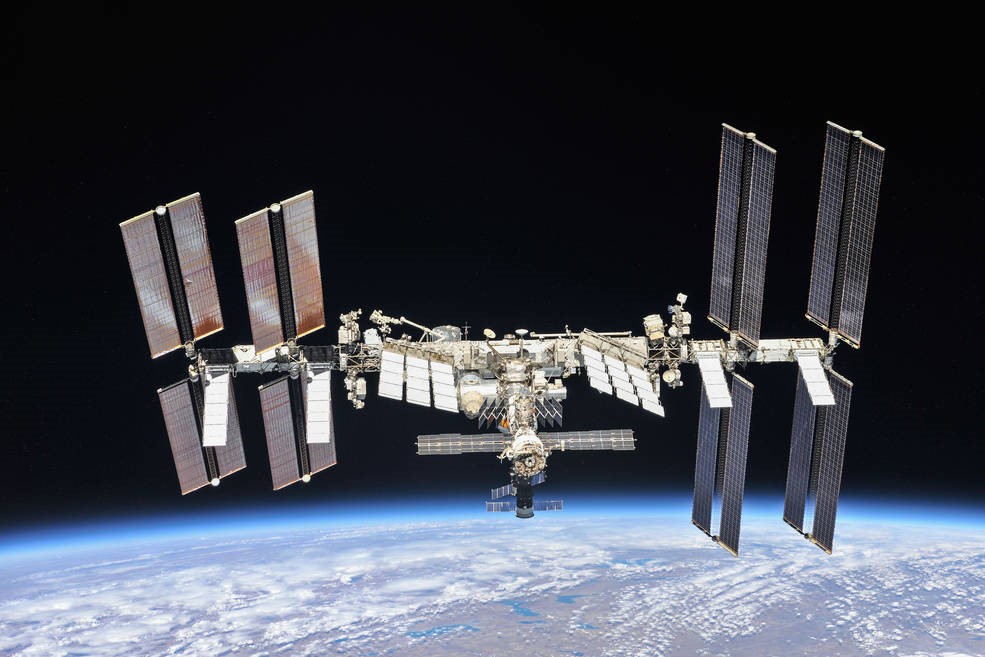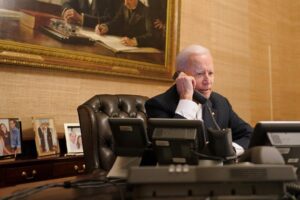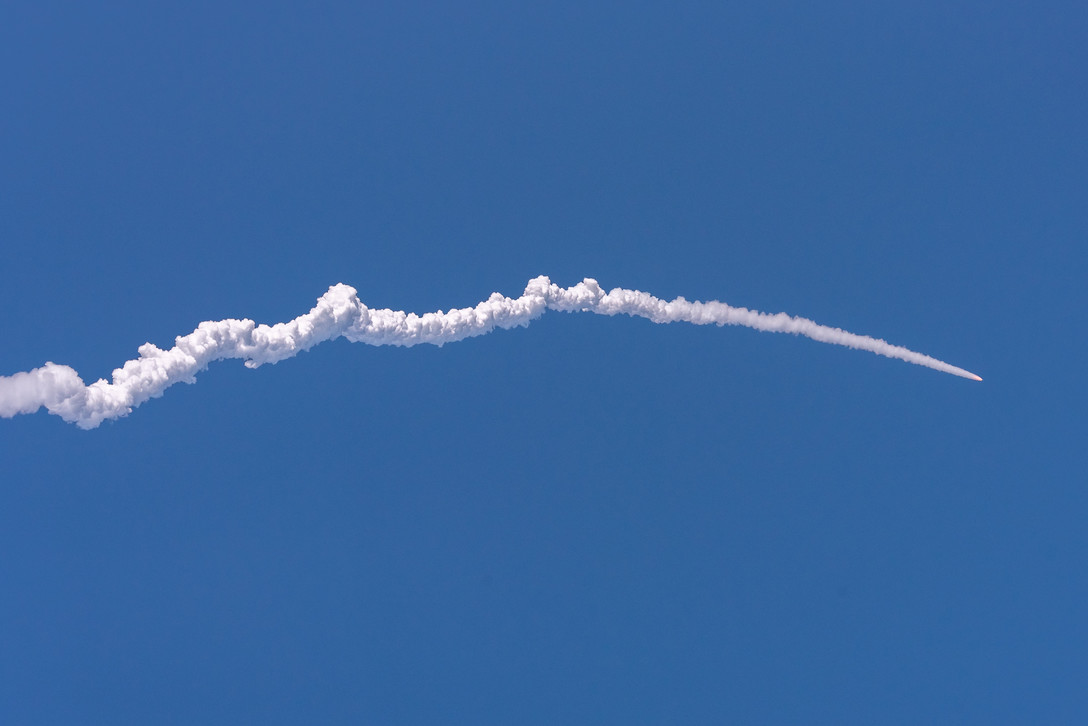
Russia is becoming vocal and threatening with its space assets, getting aggressive with its words and actions against the United States and Europe with regards to missions dealing with space. If this escalation continues, it could threaten lives of astronauts in space as well as people on Earth.
Dmitry Olegovich Rogozin has been serving as Director General of Roscosmos since 2018. Roscosmos is the Russian equivalent of NASA. Previously he was Deputy Prime Minister of Russia in charge of the defense industry from 2011 to 2018. Yesterday, he blasted U.S. President Joe Biden and his sanctions, nicknaming them “Sanctions of Alzheimer Biden” in a swipe against the President’s mental fitness.
Rogozin took to Twitter to post a full tirade against the sanctions that will likely bring devastating impacts to the space agency he runs; this is a Google translation of his thoughts he originally Tweeted in Russian:

“SANCTIONS OF ALZHEIMER
Biden said the new sanctions would affect the Russian space program. OK. It remains to find out the details:
1. Do you want to block our access to radiation-resistant space microelectronics? So you already did it quite officially in 2014. As you noticed, we, nevertheless, continue to make our own spacecraft. And we will do them by expanding the production of the necessary components and devices at home.
2. Do you want to ban all countries from launching their spacecraft on the most reliable Russian rockets in the world? This is how you are already doing it and are planning to finally destroy the world market of space competition from January 1, 2023 by imposing sanctions on our launch vehicles. We are aware. This is also not news. We are ready to act here too.
3. Do you want to destroy our cooperation on the ISS? This is how you already do it by limiting exchanges between our cosmonaut and astronaut training centers. Or do you want to manage the ISS yourself? Maybe President Biden is off topic, so explain to him that the correction of the station’s orbit, its avoidance of dangerous rendezvous with space garbage, with which your talented businessmen have polluted the near-Earth orbit, is produced exclusively by the engines of the Russian Progress MS cargo ships. If you block cooperation with us, who will save the ISS from an uncontrolled deorbit and fall into the United States or Europe? There is also the option of dropping a 500-ton structure to India and China. Do you want to threaten them with such a prospect? The ISS does not fly over Russia, so all the risks are yours. Are you ready for them? Gentlemen, when planning sanctions, check those who generate them for illness Alzheimer’s. Just in case. To prevent your sanctions from falling on your head. And not only in a figurative sense. Therefore, for the time being, as a partner, I suggest that you do not behave like an irresponsible gamer, disavow the statement about “Alzheimer’s sanctions”. Friendly advice.”
Last month, NASA unveiled plans to abandon and de-orbit the International Space Station in early 2031. However, that plan in its current form requires Russian help and Russian rockets to safely decommission the huge space station. While many other nations participate and run the ISS, most efforts are the work of the joint effort of Russia and the United States.
NASA hasn’t said much about the threat, other than to say cooperation is expected to continue. In a statement shared with the press, NASA said it was continuing to work with all of its international partners, including Roscosmos, for the ongoing safe operations of the USS. “The new export control measures will continue to allow U.S.-Russia civil space operations,” NASA added. “No changes are planned to the agency’s support for ongoing in-orbit and ground-station operations.”
Russia isn’t being exclusively aggressive against the U.S.; they are also taking steps against Europe. Today, Roscosmos announced they were suspending cooperation with Europe on space launches from the Kourou spaceport in French Guiana in response to Western sanctions over Ukraine.
“In response to EU sanctions against our enterprises, Roscosmos is suspending cooperation with European partners in organizing space launches from the Kourou cosmodrome and withdrawing its technical personnel, including the consolidated launch crew, from French Guiana,” Rogozin said.
To respond to that action, Thierry Breton, the European Commissioner for Space from the European Commission, released a statement today:
“As Commissioner in charge of European space policy and in particular of the European space infrastructures Galileo and Copernicus, I take note of the decision of the Russian space agency Roscosmos to withdraw from the Guiana Space Centre in Kourou, following the sanctions imposed on Russia by the EU and its partners in response to Russia’s military aggression in Ukraine. I confirm that this decision has no consequences on the continuity and quality of the Galileo and Copernicus services. Nor does this decision put the continued development of these infrastructures at risk. We will take all relevant decisions in response to this decision in due course and continue developing resolutely the second generation of these two EU sovereign space infrastructures. We are ready to act decisively, together with the Member States, to protect these critical infrastructures in case of aggression, and continue to develop Ariane 6 and VegaC to ensure Europe’s strategic autonomy in the area of launchers.”
United States space entrepreneur Elon Musk also got into the fray on Twitter, replying to Rogozin’s rant by simply posting his SpaceX logo at him. In addition, Musk is sending high-speed internet terminals to the Ukraine and activating satellite-based Starlink internet service for people there. Musk has also said SpaceX rockets and crewed spaceflight vehicles could be used by NASA to help should Russia interfere with the ISS.
— Elon Musk (@elonmusk) February 26, 2022
In April 2020, Russia also launched a missile targeted at a satellite in space. The United States Space Force, the newest addition to the United States military, issued a stern warning about increasing international threats to space endeavors when Russia tested an anti-satellite missile project. In an announcement shared with the media, U.S. Space Command said they were aware and were tracking Russia’s direct-ascent anti-satellite missile test, also known as DA-ASAT.

“Russia’s DA-ASAT test provides yet another example that the threats to U.S. and allied space systems are real, serious and growing,” said General John W. “Jay” Raymond, USSPACECOM commander and U.S. Space Force Chief of Space Operations. “The United States is ready and committed to deterring aggression and defending the Nation, our allies, and U.S. interests from hostile acts in space.”

While Russia is battling with the United States and Europe on the space front, they appear to be getting closer with China. At the end of the year last year, Russia said they were working with China to negotiate a comprehensive relationship/partnership on space matters. The two have already created joint-efforts; they recently agreed to the establishment of an International Lunar Research Station (ILRS) by 2035. Another is the development of the ground segment of the two countries’ national satellite systems – Russia’s GLONASS system and China’s BeiDou Navigation Satellite System (BDS).
The United States has banned China’s participation in the ISS and other U.S.-based space endeavors. Because of that, China has launched their own space station and are preparing to send crews to the surface of the Moon to set-up a moonbase there in the coming years.
Last November, the China Meteorological Administration (CMA) announced that China and Russia have established a space weather center in Beijing as part of worldwide efforts to improve global space weather center systems. In the United States, resources depend on the work of NOAA’s Space Weather Prediction Center to do the same.